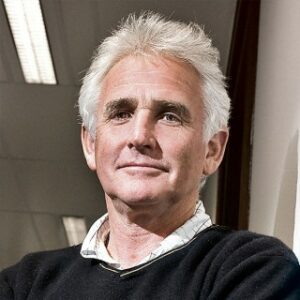1.5 degrees C is already behind us. Could 2 degrees of warming arrive by 2030? Despite pushback, Dr. Malcolm McCulloch makes the case from Perth, during Australia’s roasting, hottest-ever February. But first, UK Professor Emeritus and psychoanalyst Paul Hoggett on climate, victimhood, and the authoritarian urge.
I’m Alex Smith. Welcome to Radio Ecoshock – exploring minds in twisted times.
Listen to or download this Radio Ecoshock show in CD Quality (57 MB) or Lo-Fi (14 MB)
CLIMATE AND THE AUTHORITARIAN URGE
DR. PAUL HOGGETT
“Never has our future been more unpredictable, never have we depended so much on political forces . . . that look like sheer insanity . . . It is as though mankind had divided itself between those who believe in human omnipotence . . . and those for whom powerlessness has become the major experience of their lives. “
– Hannah Arendt “The Origins of Totalitarianism” published in 1951.
“…times of profound uncertainty, society may be subject to a veritable plague of toxic feelings and fantasies which fuel various forms of political reaction.”
– Prof. Paul Hoggett, “Reactionary States of Mind as the Holocene Ends”

Listen to or download this interview with Paul Hoggett in CD Quality or Lo-Fi
In the UK, social policy researcher Paul Hoggett finds a key to retrogression and denial as climate and civilization spin out of control. Hoggett is Professor Emeritus at the University of the West of England in Bristol. Paul is the co-founder and first chair of the Climate Psychology Alliance. The Alliance now has a significant membership in North America as well as Europe. Climate psychology is now a rapidly developing field. Hoggett was early recognizing the need.
RESSENTIMENT
OXFORD DEFINITION OF RESSENTIMENT
“a psychological state arising from suppressed feelings of envy and hatred that cannot be acted upon, frequently resulting in some form of self-abasement.”
The key here is a concept conceived almost a hundred years ago by German philosopher Friedrich Nietzsche: “ressentiment”. This French word sounds like “resentment” but with a difference. Nietzsche, followed by German philosopher Max Scheler in the early 1900’s, developed a psychology of the mind before Sigmund Freud pioneered psychoanalysis.
See if you can guess who this describes, as Paul Hoggett writes:
“The ressentiment subject is therefore one who cannot forget, who repeats real and imagined wrongs, slights and insults over and over again. And Nietzsche is in no doubt that the imagined wrongs are more powerful than the real ones.”
Is that Donald Trump – or is that millions of people who follow that mental trail, and not just in America? When we look at attendees of Trump rallies, they are almost all white, many working class. Dr. Hoggett published a number of studies on white working class grievance in the United Kingdom. How did they go from “We Are the Champions” to “We Are the Victims”?
We see manipulation of millions of minds with rather crude theater about evil child-eaters secretly running everything, to be defeated by the super hero leader who must be given all powers. We see it. But can this analysis offer us tools to prevent or treat it? Most of us encounter people – friends, workmates, or family – who very strongly believe they are victims in search of justice. All facts to the contrary are labeled as government, media or academic lies. How can characters nursing deep wounds – real or imaginary – be reached – or can they?
Suppose there is no cure for large divisions in our country, just as we have no cure for HIV or the Corona virus. How does this system continue?
We’ve already seen papers like “Donald J. Trump and the rhetoric of ressentiment” and articles like “The Trump Horror Show through Nietzschean Perspectives”, But I fear we are missing the point. Millions, maybe billions of people feel left behind in a world of mega billionaires playing with artificial intelligence. Hit by climate storms and fires we are afraid. The new authoritarians have answers. Even the worst answers are something to believe in. We know why mental illness is becoming the norm. We just don’t know how to heal it.
SOREN KIERKEGAARD WRITES:
“In a burst of momentary enthusiasm people might, in their despondency, even long for a misfortune in order to feel the powers of life, but the apathy which follows is no more helped by a disturbance than an engineer leveling a piece of land.”.
– Søren Kierkegaard, The Present Age 1846.
NEW BOOK FROM HOGGETT
We also talk about Paul’s new book book, “Paradise Lost? The Climate Crisis and the Human Condition”. He finds the climate emergency can drive authoritarian nationalism.
Paul has a serious history helping to connect psychoanalysis and the climate crisis. For example he edited the 2019 book “Climate Psychology, On Indifference to Disaster”. He has helped develop climate-aware mental care.
NOT SOLVABLE
Part of the modern mystique is a belief that with science, technology, and effort every problem can be solved. In his 2023 paper “Reactionary States of Mind as the Holocene Ends” Hoggett suggests there may be no solution for the climate crisis. I ask him why.
International climate negotiations likewise try to force reality to fit the system, as though Nature’s timetables are governed by the slow pace of social change and the resistance of vested interests. Lack of contact with reality leads to really bad things. Is this a sign of growing authoritarian desire at work?
Here’s the thing. You should read this short paper on Reactionary States of Mind and see if puts words to your own perceptions and makes sense of social developments. And listen to our interview. Unlike Microsoft Copilot (short review below) – I do not want to paraphrase what has already been said better by Hoggett, like this interplay between Hoggett and Hannah Arendt’s 1951 “Origins of Totalitarianism”.
“...we have a form of thinking that claims to be so in touch with the truth as to be unperturbed by the disconfirmations of messy reality, that is, it is in touch with a supposedly truer reality “concealed behind all perceptible things, dominating them from this place of concealment and requiring a sixth sense that enables us to become aware of it” (p. 618). Arendt adds that it is this sixth sense that one can acquire by becoming an adept of the ideology; by mastering the important texts, one is able to intuit the hidden meanings and secret intents behind public events (this way conspiracies lie).”

Hannah Arendt
And last word to Hoggett (“Reactionary States of Mind”):
“…totalitarian thinking comprises a closed system of logical deductions from abstract premises – in other words, reality is forced to fit the system, not the other way around: it “orders facts into an absolutely logical procedure [that] starts from an axiomatically accepted premise, deducing everything else from it; that is, it proceeds with a consistency that exists nowhere in the realm of reality”.
=========================
HAVE WE PASSED 1.5, HEADING FOR 2 DEGREES BY 2030?
MALCOLM MCCULLOCH
The planet is hotter than ever, summer and winter. An experienced Australian scientist says the world is already past 1.5 degrees C. over pre-industrial. His new study published in Nature Climate Change suggests we may cross two degrees of warming in the late 2020’s – way before mainstream projections. Malcolm McCulloch and co-authors raise controversy and questions. But it may explain what all of us are experiencing lately.

Dr. McCulloch is Emeritus Professor with the University of Western Australia Oceans Institute. Malcolm won multi-million dollar grants for his research, particularly on coral. With over 270 scientific papers, his work is highly cited.
Listen to or download this interview with Malcolm McCulloch in CD Quality or Lo-Fi
During this interview, it was blistering hot in Perth Australia, well over 100 degrees F or 40 C. This was just part of the hottest February ever recorded in Australia (since the 1700’s). Western Australia has plenty of reasons to ask why the weather is hotter than expected for 2024.
As you know, at the start of 2024 ocean temperatures are up to two degrees hotter than usual – globally. Scientists are stunned and worried. Even a fraction of a degree extra warmth in the sea represents massive amounts of heat and energy. We are way beyond that.
What is going on? James Hansen and his associates (like Leon Simon) have their explanation, best summarized in Hansen’s post “Global Warming in the Pipeline”. They point to Earth’s energy imbalance, as measured at the top of the atmosphere, and regulations cutting sulfur pollution in shipping (coming into effect in 2020).
Malcolm McCulloch finds mainstream science, including the Intergovernmental Panel on Climate Change, left out about half a degree of warming by omitting heating during the early industrial era, in the 1800’s. Because measurements in those times (like sampling a bucket of water off merchant ships) are not reliable enough, the IPCC decides warming starting really around 1900, when there are better records. They count the period 1850 to 1900 as “pre-industrial”.
Of course ships converted from sail to coal burning in the early to mid-1800’s, and coal-burning steam trains were already expanding by 1850. Industries from cement to steel were flourishing. The period 1850 to 1900 was not “pre-industrial” at all.
What we need is accurate temperature measurement, ideally since the 1700’s – really pre-industrial. As a recognized oceans researcher, Malcolm McCulloch found that temperature gauge in nature. A type of sea sponge – ancient creatures – draw in calcium to make their body structures, layer on layer.

By the way, sea sponges are considered animals not plants. They have no central nervous system, digestive system or circulatory system – and no organs. Sponges appeared at least 500 million years ago. Their calcium structures formed the earliest reefs, before coral reefs. We discuss similarities between sponges and coral (McCulloch’s specialty) in the interview.
Within the calcium, small amounts of the radioactive material Strontium also appears in the sponges. The relationship between strontium and calcium in the sponges has been shown to reflect the temperature of the water. They are living thermometers who record conditions – not daily weather, but longer-term, over a year.
McCulloch picked a type of sponges – sclerosponges – living in the Caribbean. These were several hundred years old. They formed in the dark, far below the affects of weather. In the Caribbean, they were isolated from cyclical heat changes like El Nino or even the “Gulf Stream” (technically called the Atlantic Meridional Overturning Circulation). So they make good temperature recorders.
Using other checks, this team also found ocean temperature records in the Caribbean (like those measured by satellites now) are fairly close to average for world ocean temperatures. So these Caribbean sponges, McCulloch argues, are decent representatives for the global average ocean temperature. They are not the SAME as world average sea temperatures, but good representatives.
With all this, the sponges say there was about .6 degrees of warming in the ocean during the 1800’s, which would be about .5 degrees warming on land. The IPCC figures, and most climate models, do not reflect this early warming.
So what? Well, the IPCC scientists report very big changes that can develop between 1.5 degrees C. of warming, considered the upper danger zone, and two degrees. Every half a degree of warming has huge impacts, and may trigger tipping points. If McCulloch and his colleagues are right, we passed 1.5 degrees of warming several years ago and will likely hit those two degree impacts as early as 2030. That is serious news.
Some other scientists, including the big names you know, disagree and discount McCulloch’s work. Michael Mann, Stefan Rahmstorf, and Zeke Hausfather are dismissive, saying a single measuring system tells us very little. They defend the IPCC and mainstream climate modeling, saying recent record-smashing global heat IS within the upper-most warnings. In the next few years, we will find out who is right – maybe the hard way.
Scientists challenge ‘flawed communication’ of study claiming 1.5C warming breach
This paper is going to get more traction because global climate models, the IPCC and “mainstream scientists” did not predict and cannot account for the extreme warming in 2023 and so far on-going record shattering warmth in 2024. Not just the public, but some scientists are asking what is wrong with our models and structures. We don’t know if we just experienced a temperature excursion and will retreat to cooler times again, or if this is the new normal triggered by a tipping point we missed.
MORE CARBON – LESS IMPACT?
One minor point in this very informative paper by McCulloch et al says:
”Since the mid-1980s, the temperature sensitivity to increasing CO2 has halved, from 0.17 ± 0.02 °C per 10 ppm CO2 during 1964–1984 to the present-day (1985–2020) 0.08 ± 0.02 °C per 10 ppm CO2 .”
That sounds like a ton of carbon emitted in the 1970’s would create more warming than a ton of carbon emitted now, maybe twice the impact. Malcolm confirms this in the interview.
READ ABOUT UN-COUNTED WARMING IN “THE CONVERSATION”
I highly recommend Malcolm’s article for the public in The Conversation.
HERE IS THE PAPER BY MCCULLOCH ET AL.
The new paper is “300 years of sclerosponge thermometry shows global warming has exceeded 1.5 °C”. That is Open Access (free to anyone) as published 05 February 2024 in Nature Climate Change.
======================
AI: MICROSOFT COPILOT LIES AND CHEATS
Microsoft copilot pretends to succeed but cheats and fails.
The icon for a Windows AI showed up on my computer screen. I tested it on the search “Donald Trump and ressentiment”. The results were impressive, with citations. But five out of the six paragraphs cited just two sources, meaning Copilot paraphrased one peer-reviewed article and a piece of journalism. A couple of people had their work used, but no credit mentioned in the text, and certainly no royalties or pay. The AI machines just take others work and make it their own, as any failing college student learns to do.
Getting beyond text ideas, Copilot floundered. I asked for the number of listens of Radio Ecoshock shows on Soundcloud, where the show is posted every week. The figures returned were flattering but completely untrue, up to ten times larger than the obvious totals Soundcloud gives. Copilot made it up.
I asked how many views on the Radio Ecoshock YouTube channel. Copilot returned the same false numbers as the first question. But one of the top listed programs in their AI result appeared on radio, but never on YouTube. It was a total fabrication. How many people will rely on this major brand AI tool and lose face, money, or worse?
Microsoft CoPilot is based on ChatGPT4. It is too bad, but this artificial intelligence is too artificial, not credible, and not even trustworthy. That’s my take.
I’m back to Google search, which at least gives me a wide choice of original sources, beyond government and corporate pushed and curated information. But now we hear the new Google AI being tested stays entirely within it’s own crawling and records, not sending the user to any outside site. Does that mean AI users will never again visit Radio Ecoshock or this blog? My work will just be paraphrased (or wrongly presented) but the original journalist is never known, or hardly cited? Who will be left to produce information – or does that matter when AI can make it all up?
Please support my work with your donation, while it is still here!
I’m Alex Smith. Thank you for staying tuned, and caring about our world.